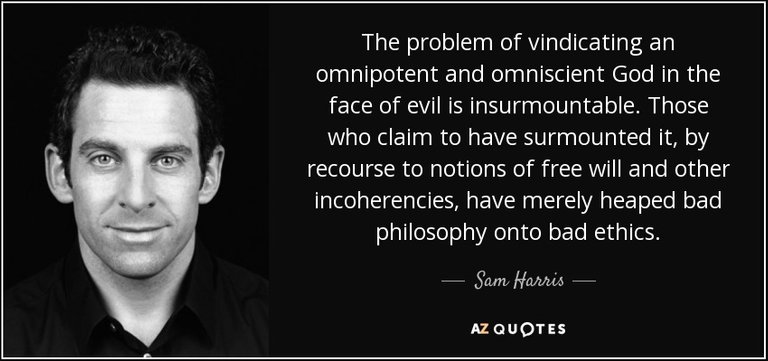Hello friends,
Today I'd like to share my thoughts on the philosophical argument regarding the problem of evil. For those of you who are unaware of this philosophical argument, this is namely the attempt to provide a reconciliation between two assumptions:
- The existence of an all omniscient (all-knowing), omnipotent (all-powerful) and perfectly good God.
- The presence of evil in our world.

This argument has troubled thinkers, philosophers and theologians alike for a very long time. Depending on the scope and goal of their investigation, throughout the years each thinker has attempted to either reconcile these two premises or refute the one in support of the other. The most common attempt to prove only of the premises as true, at the expense of the other, is the atheistic argument which states that the existence of evil in this world disproves the existence of an omniscient, omnipotent and perfectly good God. I will try and investigate the logic behind this line of thought and provide reasons as to why I believe that this argument is unsound in its most simple form.
Perhaps the first philosopher who contemplated on the problem of evil was Epicurus. What is today known as the Epicurean paradox states precisely:
Is God willing to prevent evil, but not able? Then he is not omnipotent.
Is he able, but not willing? Then he is malevolent.
Is he both able and willing? Then whence cometh evil?
Is he neither able nor willing? Then why call him God?
— The Epicurean paradox, ~300 BCE
Here Epicurus makes the following cases: Either God is not able to prevent evil ( thus he is not omnipotent ) or not willing to ( thus malevolent ) or not able nor willing at the same time ( thus he is not God ). Apart from the Epicurean paradox this is also knows as the Epicurean trillema. However though that there are 4 options in his argument and not three so it's quite obvious that this is not a trillema.
While Epicurus's line of thought might seem sound, his third statement concludes in a question that requires further investigation as it is the only one that does not conclude somewhere. Surely, he does not provide any answers to this and thus his whole argument also hangs on that question:
Whence cometh evil if God is both able and willing to stop it?
In this point it is neccesary to differentiate between two notions:
The first one is the idea of God. The idea of God tries to define God only through his traits and particulars. Here God is considered only through his powers and abilities and without any personal reference to His person.
The second notion is the Person of God. Here God cannot be solely considered through his abilities and powers as these are only aspects of Him and in order to sufficiently appreciate His nature we must investigate God through His person. In this analysis the Person of God is the one present in the Judeo-Christianic theology.
Here we can see the first problematic assumption in the argument presented by Epicurus. By using the idea of God without making any explicit reference to any specific conception of God in his time ( for example Zeus or Ares ), he strips significance from the person of God by trying to conceptualize him only through his parts and particulars. Thus, when Epicurus uses the word ''God'' he only considers parts of him and not his whole being. Similarly, in a first attempt to refute the existence of God based on the presence of evil, modern thinkers and scholars tend to present God through his notion and not through his Person and thus being unable to provide sufficient reasons for or against their arguments simply because they strip significance from what they call ''God''.
Back to Epicurus's question, our understanding of God and evil through the Judeo-Christian tradition provides more than enough reasons as to why evil exists in this world. When it comes to us, men, the disodedience of the first man and woman towards God's only command led to our collective fall and thus allowing sin and death to enter in our lives and also leading to an increase of evil in this world. Notice I use the word this. I will not stand on whether this is something literal or symbolic in nature as this is another subject.

Notice also this. The presence of evil in the Judeo-Christianic tradition predates the existence of men. If we choose to examine the problem of evil, not as a sterile philosophical thought experiment, but rather in its full significance we must first have the right understanding as to what the word ''God'' constitutes in our argument and also a proper understanding as to what evil is. In my opinion, the Biblical canon includes all the reasons as to why evil exists and why it is present in this world and reconciles both assumptions made in the philosophical argument regarding the problem of evil. As of now and for the reasons explained, secular logic has failed to provide sufficient answers to this problem and attempts to reach a conclusion are either insufficient, fallacious or even subservise in nature.

Overally, I'm very skeptical with the problem of evil. Whenever someone uses this argument to refute the existence of God my natural question is '' What do you mean by the word 'God'?''. Trust me, you will get some very interesting ( and troubling ) answers and most of the times your interlocutor will then proceed to prove why God is bad ( thus altering the definition that he gave in the begining ) by reciting verses from the Old testament ( because 99% of the time he will also be concerned with God in Judeo-Christianic tradition and he will also be the first to state it, thus suffering from confirmation bias ) and diverting the whole discussion elsewhere thus falling into one of the most common fallacies which is strawn man argument.
Thank you for reading!
Overthinking it.
If believers believe in God, so would other.
They say, lead by example and other will follow.
If God is the creator of all and is all mighty, was his power following through and manifesting in his believer?
The answer is no. So how can people believe you if his power isn't even shining through you.
I call them sheep, not believers. Its the same like a political party, if the leadership is weak, people will just stop following. Don't expect a logic sound argument from non believers, understand why are they like this.
Start with judgment upon yourself first, this is what i do
We must always withold judgment for others and judge ourselves more eargerly. I believe in this.
Yet we also have to say what we have to say. If it's wrong, it will be judged. I understand what you say about believers but it's not solely their problem @coachjoachim. There are powers in this world that won't follow whatever we do. So we have to expose them. So it is my duty to do so as His follower.
God bless you!